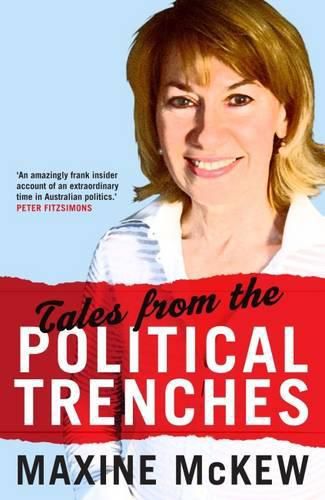Maxine McKew and Sally Warhaft chat about Tales from the Political Trenches
In

It was the ousting of one prime minister that launched Maxine McKew into politics. It was the ousting of another that has now launched her into print. Five years ago, McKew became the symbol of Labor triumphant when she defeated John Howard in his seat of Bennelong, part of the electoral swing that swept Kevin Rudd into power. But disillusioned with Rudd’s fall at the hands of his own party, and serving only one term, she has elected to bear witness to events.
McKew began the book late last year, intending to publish after the next election. She says she changed her mind when she ‘saw the way Rudd’s character was torn apart’ by Julia Gillard’s retinue in February:
‘There is no doubt those who moved against Rudd have been masterful in the way they have cemented a particular narrative … and what they see as his deficiencies: some sort of out-of-control martinet who had contempt for his colleagues and who was hopeless at any kind of process.’
Her defence of Rudd, whom McKew describes as ‘a man with a formidable intellect and an innate sense of decency’, is as cool as tempers in Canberra have grown heated. Tales from the Political Trenches is not so much a damnation as it is a devastating alternative history. Events are recalled principally through interviews with former colleagues, on and off the record. It is the testimony of these people, still in power, that will be most embarrassing for the government.
‘I know that this will be a hard book, a really hard book, for many in the Labor Party, and in the wider Labor movement,’ McKew says. ‘Others, I have to say, will welcome it, because actually they’re fed up with the way Rudd was demonised … There is nothing in it for Labor to abuse its leaders like this.’
McKew knows she will be accused by some of disloyalty, but sitting quietly was not an option. ‘I don’t believe in blind, silent loyalty,’ she tells me. ‘I am taking aim at those people who take the view that there is one eternal truth, and it happens to be the eternal truth that is told by those who moved against Rudd. That idea is ludicrous.’
Interviewing McKew isn’t easy. An accomplished interviewer herself, as well as a former politician, she is wise to every trick of both trades. You sense that she would have loved the intrigue around Rudd’s defenestration in her former guise as a broadcaster. Describing it as an onlooker is more difficult.
Gillard’s ascension was planned and executed by a small group of people; most of the caucus was locked out, clueless. McKew was at a diplomatic dinner party in Canberra on 23 June 2010 when the first rumblings of a leadership challenge broke on the ABC’s 7 o’clock news. Asked by a guest at the dinner if Australia was ready for a female prime minister, McKew could only offer a prickly reply: ‘We have a prime minister.’ Three hours later, the Australian Workers’ Union’s Paul Howes gave his extraordinary interview on Lateline. McKew phoned Senator John Faulkner, who shared the view that ‘a collective madness had taken hold’.
On the likelihood of the ALP healing its wounds and making peace with Rudd, McKew has the shadowy optimism born of necessity: ‘The Labor family is an exceptional beast, but it is possible. Even very damaged families, even events that are so traumatic, finally they’re aired and a way is found of accommodating disparate interests and individuals. There is nothing in it for the party to continue as it is.’ Maybe. All happy political families are alike, but the Labor family is unhappy of its own design. And it’s being tested yet again in its response to this book.
McKew considers herself loyal to the Labor Party and its cause, but is dismayed by the tone and tactics of the government. ‘We’re still playing divide and rule in a whole lot of unique and extraordinary ways,’ she says, referring to the Howard years. ‘I don’t think there’s anything for Labor to be playing the gender card, the class card, the geographic card… The government is in charge of the agenda, the government can determine the tone.’
Serving just one term no longer keeps Maxine McKew awake in the middle of the night, but she still genuinely misses her job: ‘I am pretty resilient, there’s no doubt about that,’ she says, ‘but I suppose it did shock me. I suppose the aftershocks shocked me, put it that way.’ McKew says the book was written with a disappointed heart: ‘I beat John Howard and I got beaten by John Alexander. I don’t like that, no. Mind you, it’s no longer the 3 o’clock-in-the-morning question. Everybody tells you, “It’s not your fault, you’ll get over it, it’s a marginal seat”, and all that’s true, but it does feel very personal. I felt a profound sense of personal failure for a long time … I took a very long time to make that decision [to run for the seat in the first place]. It wasn’t a five-minute decision, and it’s what I really wanted to do with that stretch of my life.’
Tales from the Political Trenches will reignite arguments about Kevin Rudd and what happened to him. People have strong views about it and see things differently. It has already revived leadership speculation. The current prime minister will not be happy, but that’s too bad. McKew ‘never shook the feeling that Gillard saw me as an irritant’ and now probably never will.
McKew experienced similarly ambivalent sensations in writing the book. ‘There are moments when you feel you’ve crafted something and it absolutely captures the essence of what you want to say. There’s also a period when you get into it and you think, “This is swallowing me, this is taking over my life, all these characters are inhabiting my head. I want them to leave! How do I stop it?” And you’re too far into it to abandon the exercise, you have to keep going.’
It sounds a little like the situation now facing political Labor too.
Tales from the Political Trenches
Sally Warhaft is a Melbourne anthropologist, broadcaster and former editor of


